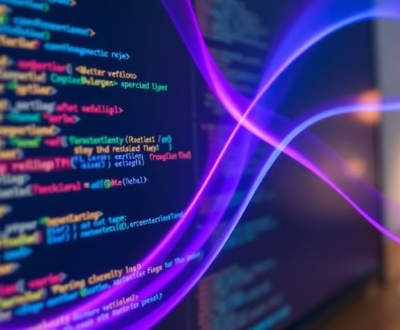Artificial Intelligence (AI) is changing the way we design and manage websites. By using AI, we can make websites more user-friendly, improve performance, and enhance security. This article explores how AI can help create better web experiences and what the future holds for web design.
Key Takeaways
- AI helps deliver personalized content to users, making their experience unique.
- With AI, websites can analyze user behavior in real-time for better engagement.
- AI can automate repetitive tasks in web development, saving time for designers.
- AI enhances website security by detecting threats and preventing attacks.
- Using AI for marketing can boost conversion rates by targeting the right audience.
Enhancing User Experience with AI Web Design
Personalized Content Delivery
AI is changing how websites connect with users by offering personalized experiences. This means that websites can now show content that matches what each visitor likes. For example:
- Tailored recommendations based on user behavior.
- Dynamic content that changes as users interact with the site.
- Real-time adjustments to meet user preferences.
AI-Driven User Behavior Analysis
Understanding how users act on a website is crucial. AI helps by analyzing user behavior to improve the overall experience. Some benefits include:
- Identifying patterns in user interactions.
- Predicting future actions based on past behavior.
- Enhancing engagement through targeted content.
Real-Time Customer Segmentation
AI can divide users into groups based on their behavior and preferences. This allows for more effective marketing strategies. Key points include:
- Dynamic segmentation that updates as user data changes.
- Targeted marketing campaigns that reach the right audience.
- Improved user satisfaction through relevant content delivery.
By using AI, websites can create a more engaging and personalized experience for every visitor, leading to higher satisfaction and loyalty.
In summary, leveraging AI in web design not only enhances user experience but also builds a stronger connection between brands and their customers.
Boosting Website Performance Through AI Integration

Integrating AI into your website can significantly enhance its performance. AI tools can analyze data and optimize your site to attract more visitors and keep them engaged.
AI-Powered SEO Optimization
AI can help improve your website’s visibility on search engines. Here are some ways it does this:
- Keyword Analysis: AI tools identify high-performing keywords to target.
- Content Optimization: They suggest improvements to make your content more appealing.
- Competitor Analysis: AI analyzes competitors to help you stay ahead.
Automated Content Generation
AI can create content quickly and efficiently. This includes:
- Blog Posts: Generate articles based on trending topics.
- Product Descriptions: Create engaging descriptions for your products.
- Social Media Posts: Automate your social media content to keep your audience engaged.
Performance Analytics and Monitoring
Monitoring your website’s performance is crucial. AI tools can:
- Track user behavior in real-time.
- Identify performance bottlenecks.
- Provide actionable insights to improve load times and user experience.
By leveraging AI, you can discover how AI can skyrocket your site’s traffic. Uncover tactics for leveraging AI tools and keywords to draw more visitors.
In conclusion, integrating AI into your website not only boosts performance but also enhances user experience, making it a vital strategy for any online business.
AI Tools for Streamlined Web Development

In today’s fast-paced digital world, AI is transforming web development by making it easier and faster. Here are some key areas where AI tools can help:
Code Line and Snippet Suggestions
AI tools can suggest code lines and snippets based on existing programming data. This helps developers write code more quickly and with fewer mistakes. Some popular tools include:
- GitHub Copilot
- Tabnine
- Microsoft’s IntelliCode
These tools learn from your coding style and improve over time, making coding smoother and more efficient.
AI-Assisted Debugging and Troubleshooting
AI can help find and fix bugs in your code. It analyzes data to identify issues and can even suggest solutions. This means less time spent on debugging and more time on creating. Tools like DeepCode and Snyk are great for this purpose.
Automating Repetitive Tasks
AI can take over boring, repetitive tasks that usually slow down development. This includes:
- Automating code generation
- Streamlining testing processes
- Managing routine maintenance tasks
By using AI, developers can focus on more important and creative aspects of their work.
AI is not just about speed; it’s about enhancing creativity and efficiency in web development.
In summary, leveraging AI tools can significantly improve the web development process, making it faster, more efficient, and less prone to errors. As we move forward, these tools will continue to evolve, offering even more capabilities to developers.
Improving Website Security with AI
In today’s digital world, AI plays a crucial role in keeping websites safe from threats. By using advanced technology, businesses can protect their online presence more effectively than ever before.
Threat Detection and Prevention
- AI systems can quickly identify potential threats before they become serious issues.
- They analyze patterns in data to spot unusual activities that might indicate a security breach.
- Automated responses can be triggered to prevent attacks in real-time.
Anomaly and Malware Detection
- AI can detect malware by recognizing patterns that are typical of malicious software.
- It continuously monitors website traffic to find any strange behavior.
- This helps in identifying and removing harmful content before it affects users.
Bot Protection and Web Application Firewalls
- AI can differentiate between human users and bots, blocking harmful bots from accessing the site.
- Web application firewalls powered by AI can filter out malicious traffic, ensuring only safe users can interact with the website.
- These systems can adapt and learn from new threats, improving their effectiveness over time.
By automating complex security tasks, AI can help security teams focus on more critical issues, making the web a safer place for everyone.
In conclusion, integrating AI into website security not only enhances protection but also streamlines the process of managing threats. As technology evolves, businesses must stay ahead by adopting these intelligent solutions to safeguard their digital assets.
Leveraging AI for Marketing and Conversion Optimization
Dynamic Content Recommendations
AI can transform how businesses connect with their customers. By using dynamic content recommendations, websites can show users products or services that match their interests. This personalization helps keep visitors engaged and encourages them to explore more. Here are some benefits of using AI for dynamic recommendations:
- Increased Engagement: Tailored suggestions keep users interested.
- Higher Conversion Rates: Relevant content leads to more purchases.
- Improved Customer Satisfaction: Users appreciate personalized experiences.
Predictive Analytics for Marketing
With predictive analytics, businesses can forecast customer behavior based on past data. This helps in making informed marketing decisions. For example, AI can analyze trends to identify which products are likely to be popular. Here’s how predictive analytics can help:
- Targeted Campaigns: Focus on the right audience.
- Resource Allocation: Spend marketing budgets wisely.
- Enhanced Customer Insights: Understand what customers want.
AI-Powered A/B Testing
AI simplifies the process of A/B testing, allowing businesses to test different versions of their web pages quickly. This helps in determining which design or content performs better. Key advantages include:
- Faster Results: AI analyzes data in real-time.
- Data-Driven Decisions: Make choices based on solid evidence.
- Continuous Improvement: Regular testing leads to better user experiences.
By leveraging AI in marketing, businesses can enhance customer experience and drive conversions effectively. AI tools can analyze data and suggest improvements, making marketing smarter and more efficient.
Future Trends in AI Web Design
Voice-Activated AI Assistants
AI is changing how we interact with websites. Voice-activated assistants will allow users to navigate and search using their voice. This makes browsing easier and faster. Imagine asking a website to find information or make a purchase just by speaking!
Advancements in Natural Language Processing
Natural Language Processing (NLP) is getting better. This means AI can understand what users are saying more accurately. Websites will be able to respond to questions and provide information in a more human-like way. This will make interactions smoother and more engaging.
Predictive Analytics for User Needs
AI will use predictive analytics to guess what users want before they even ask. By looking at past behavior, websites can show personalized content or offers. This can lead to a better user experience and higher satisfaction.
As we look ahead, the integration of AI in web design will not only enhance user experience but also create more interactive and engaging platforms.
Summary of Key Trends
- Voice search will become a standard feature on websites.
- NLP will improve user interactions, making them more conversational.
- Predictive analytics will help tailor experiences to individual users.
These trends show that the future of web design is not just about looks; it’s about creating smarter, more responsive websites that understand and meet user needs.
Best Practices for Implementing AI in Web Design
Responsive and Mobile-Optimized Design
Creating a website that works well on all devices is crucial. Here are some key points to consider:
- Ensure your site adjusts to different screen sizes.
- Test on various devices to check usability.
- Use flexible images and layouts.
Data-Driven Design Decisions
Using data helps make better design choices. Here’s how:
- Analyze user behavior to understand what works.
- Use feedback to improve design elements.
- Track performance metrics to guide changes.
Continuous Improvement Through AI Feedback
AI can help you keep improving your website. Consider these steps:
- Regularly review AI-generated insights.
- Make adjustments based on user interactions.
- Stay updated with the latest AI tools and trends.
Implementing these practices can lead to a more engaging and effective website. By focusing on user needs and leveraging AI, you can create a site that not only attracts visitors but also keeps them coming back.
In summary, clearly communicate the role of AI in your design process, set realistic expectations, and provide a seamless experience for users. This will help you maximize the benefits of AI in web design.
Conclusion
In summary, using AI for your website can really change the game. It helps make your site more user-friendly and can even boost your sales. By using smart tools, you can see what your visitors like and give them what they want. This means more people will stick around and come back. Plus, AI can help keep your site safe from threats. As technology keeps getting better, those who use AI will likely stay ahead of the competition. So, if you want your website to shine, consider adding AI to your toolkit.
Frequently Asked Questions
How can small businesses use AI before creating their website?
Before making a website, small businesses can use AI to study the market and understand user behavior. This helps them learn about trends and what people like. They can also use AI to plan their content and improve search engine optimization (SEO) to attract more visitors.
What are some ways businesses can engage customers using AI on their websites?
Businesses can use AI to give personalized content suggestions and special offers based on what users do on the site. They can also use AI chatbots for quick help and to answer questions, making the experience better for customers.
How do you add AI features to a website?
To add AI to a website, you can use tools like chatbots for customer service and recommendation engines for personalized content. You can also connect AI services through APIs to add features like image recognition and predictive analytics.
What impact does AI have on website development?
AI changes website development by automating design tasks and creating more personalized experiences for users. It helps in analyzing user behavior to improve content and design choices, making websites better overall.
What are the benefits of using AI for website security?
AI helps improve website security by quickly finding and analyzing threats. It can detect unusual activities, prevent attacks, and protect against bots, making websites safer for everyone.
How can AI improve marketing on websites?
AI can enhance marketing by analyzing data to find patterns, creating content automatically, and helping with SEO. This leads to better search rankings and more visitors, improving overall marketing efforts.
About this blog
We are a digital marketing company with a focus on helping our customers achieve great results across several key areas.
Request a free quote
We offer professional SEO services that help websites increase their organic search score drastically in order to compete for the highest rankings even when it comes to highly competitive keywords.









